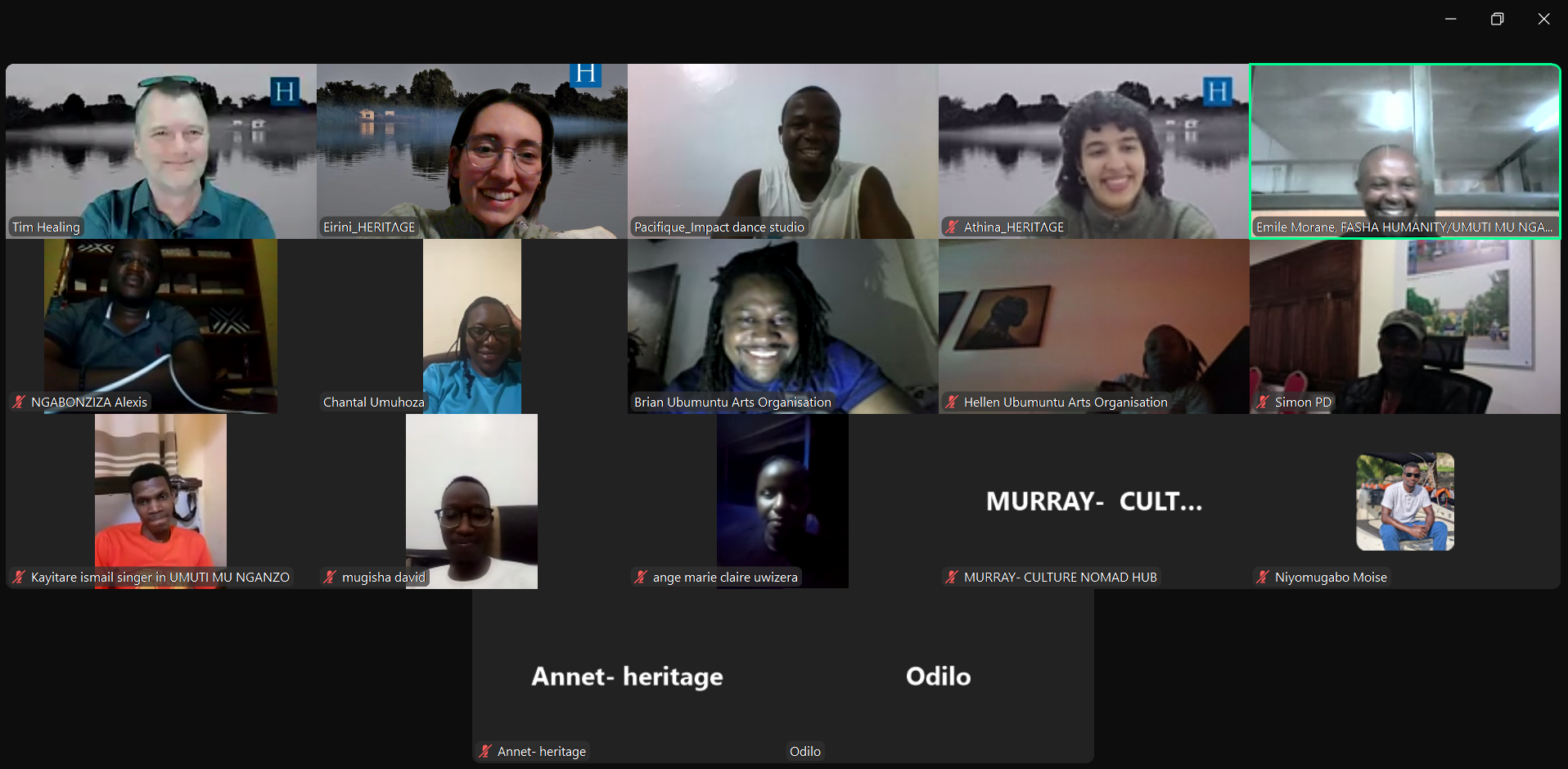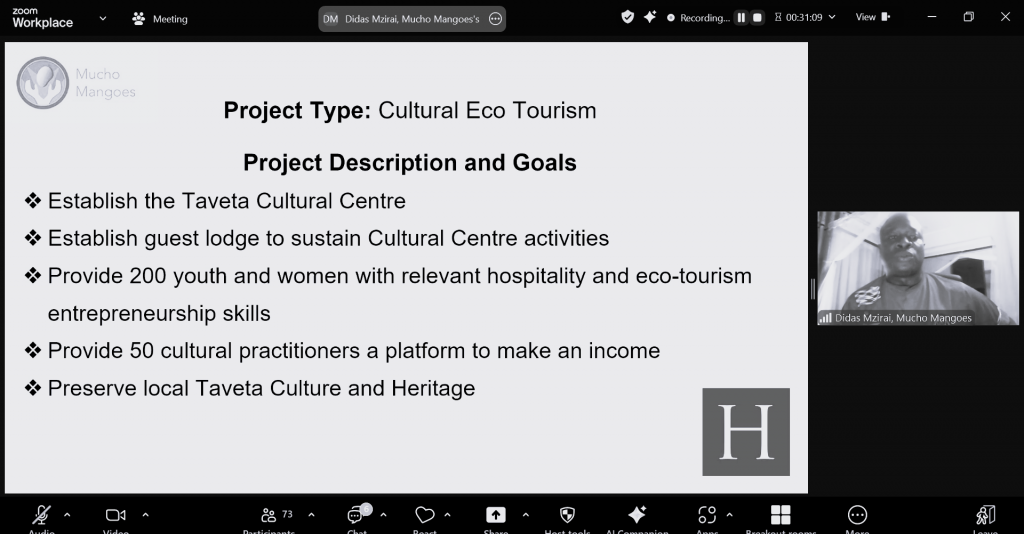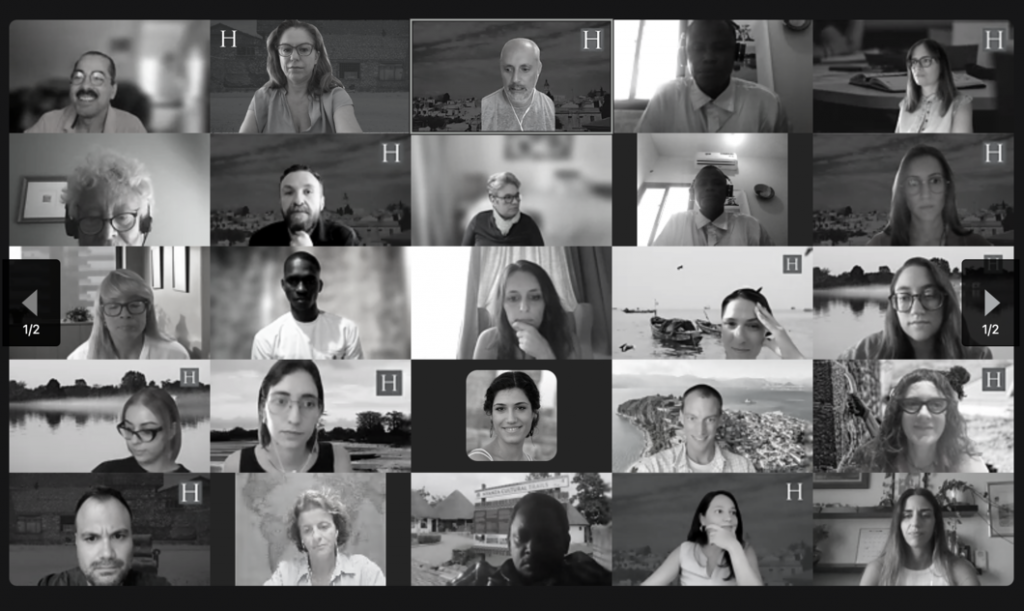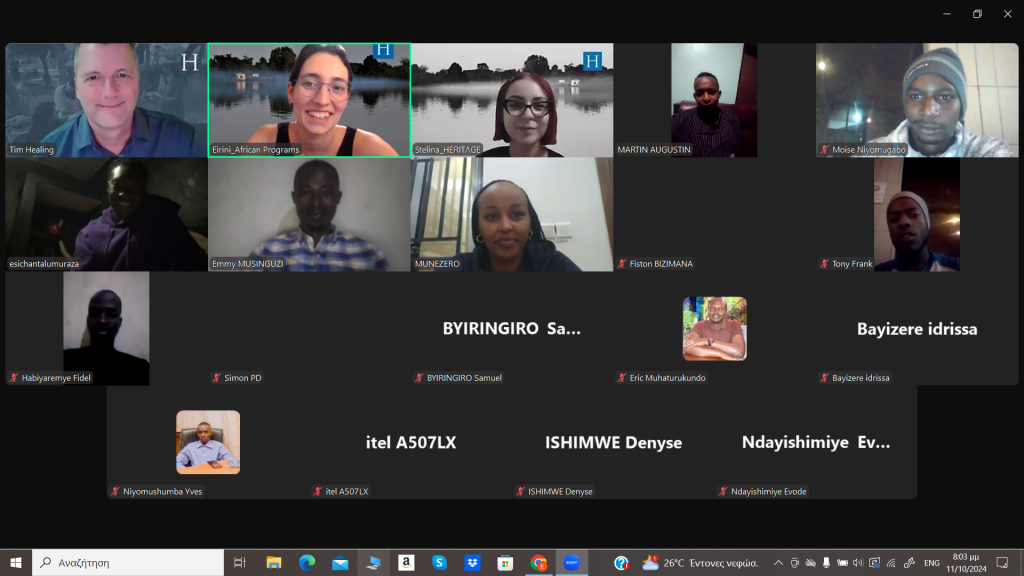: HerMaP Africa
Communication Strategy and Strategic Marketing for Cultural Organisations Workshop in Rwanda
From 19 to 21 May 2025, HERITΛGE hosted an online workshop on communication strategy and strategic marketing for cultural heritage professionals in Rwanda. Led by media professional Derwin Johnson, the training brought together 15 heritage and tourism practitioners from across Rwanda to strengthen communication practices, improve audience engagement, and support the long-term sustainability of their institutions.
Participants represented ten organisations involved in cultural preservation and tourism, including Shalom Safaris Rwanda, Red Rocks Rwanda, Ubumuntu Arts Organisation, and others.* The workshop created an opportunity for professionals to share experiences and gain practical knowledge in areas relevant to their work.
“Time keeping, interactive, appropriate to our environment and sectors, with a nice mood and feeling – the live session felt as if it was on site.”
Esi Chantal Umuraza – Art & Travel Ltd – Founder
Over three days, the group explored a range of topics related to communication planning and outreach. The first day focused on storytelling techniques and media writing. Participants worked on developing clear and compelling messages for different audiences, including journalists and the general public.
The second day covered digital communication, with an emphasis on social media strategies. Sessions addressed how organisations can use various platforms to reach wider audiences, plan and manage content, and evaluate the effectiveness of their online communication efforts.
“I mostly like how our invigilator communicated on time. The instructor helped us during this course. He’s very professional in terms of providing learning methodology, and we wish we could have more days, as the more we get deep, the more we like and become familiar with the course.”
Jean Aime Nisingizwe – Shalom Safaris Rwanda – Chief of operations officer
The final day dealt with communication during times of crisis. Participants learned how to prepare for and respond to difficult situations in a clear and professional manner. A practical simulation, including a mock interview and press conference, gave participants the chance to apply these skills in a realistic scenario.
The workshop was designed to be interactive and practical, with small group activities and hands-on exercises throughout. Project Manager Eirini Oikonomidi said “I really enjoyed the interaction among the participants, both with each other and with the trainer. The group exercises were very effective and enjoyable for everyone involved.”
For more information about HERITΛGE’s workshops, go to our open courses page, or follow us on Facebook, Twitter / X, LinkedIn or Instagram.
*Organisations represented included:
FASHA HUMANITY and UMUTI MU NGANZO
Muze Tubyine and cultural preservation
Bwishyura Kivu Boat Co-operative (BKBC)
Second Online Networking Convening of Africa Grantees
On 30th April, our Africa Grants Team hosted the Second Networking Convening for recipients of our Small Grants for Africa, bringing together over 60 participants from across Africa for a virtual session. Our small grants initiative is made possible with the support of the Mellon Foundation.
The event featured grantees, HERITΛGE staff, members of the Re-granting Committee, and representatives from several foundations, including the Mellon Foundation, ALIPH Foundation, Arcadia Fund, DRK Foundation, and Kaplan Foundation. 12 grantees presented projects from Algeria, Eswatini, Ghana, Nigeria, Rwanda, South Africa, Tanzania, Uganda and Zambia. They showcased a broad range of community-driven heritage work, from the restoration of Keana Salt Village in Nigeria to the conservation of rock paintings in Uganda.
“Heritage and culture are so important in many different ways in addressing social issues, economic issues and environmental issues”
Justin Garrett Moore, Director, Mellon Foundation’s Humanities in Place Program
After the presentations, Justin Garrett Moore from the Mellon Foundation highlighted the significant role that heritage plays in addressing various societal challenges. “We’ve supported this work because heritage and culture are so important in many different ways in addressing social issues, economic issues, and environmental issues. And I think all of the work you’ve shared here today has been showing jus the power that work has,” he told attendees./
The convening concluded with a breakout session, where participants were divided into smaller groups to discuss their projects more informally. It was also a great opportunity for participants to network with each other and promoted collaborations between individuals and groups.
This was the second out of six planned events aimed at showcasing projects funded through our Small Grants for African Heritage Projects initiative, made possible through generous funding by the Mellon Foundation. 75 projects have received around $1million in funding. You can read more about the specific projects on our Africa Grants page which is continually being updated.
Project Development and Grant Writing Workshop
From 17th to 21st March, HERITΛGE welcomed 25 participants from across Rwanda to our online Project Development and Grant Writing Workshop.The workshop aimed to help participants gain a greater understanding of the development process whilst building specialised skills along the way.
“The workshop enhanced our project planning, improved our funding opportunities through grant writing, strengthened communication, ensured sustainability, and expanded our networking for future collaborations.”
Brian Hativatye Geza, Creative Director, Ubumuntu Arts Organisation
HERITΛGE’s Tim Healing introduced the workshop by focusing on project development and project management strategies including discussing the Project Cycle Method. Participants then concentrated on the process of writing grant applications, focusing on the key elements needed to make a persuasive case. This was accompanied by case study analysis and group exercises where participants could demonstrate the knowledge they had already developed over the last couple of days. It was gratifying to see how well everyone collaborated in their teams and enthusiastically engaged with the material, asking constructive questions throughout.
“The training was well prepared, with timely and clear communication. The content and instructions were concise and easy to understand. The heritage team actively supported us during plenary and group work, creating an engaging and collaborative environment. The team rotations allowed us to connect with one another, and the overall atmosphere encouraged full participation. Great job done!
Emile Morane, FASHA HUMANITY / UMUTI MU NGANZO, CEO- President Founder Owner
The workshop was held as part of the Rwanda Programme, HerMaP Africa, which is supported by the Mellon Foundation.
Participants came from organisations including Gatore Arts, NZIZA ORGANIZATION, INGANZO Y’URURIMI N’UMUCO, Nomad culture hub, RCHA, Alexis Badege Mining Ltd, Rwanda culture conservation clubs and enterprise, Bwishyura Kivu Boat Co-operative (BKBC), Come&Dance, FASHA HUMANITY,UMUTI MU NGANZO, Dufatanye Organization, TOGETHER IS THE BEST, Educate!, Ubumuntu Arts Organisation, University of Rwanda, Akagera traditional cultural village, and Millennium Community Development Organization (MCDO).
To read more about our upcoming workshops, click here.
First Online Networking Convening of Africa Grantees
“It is important to have capacity building, to have knowledge sharing, to have networks to increase solidarity in what is very challenging work.”
Justin Garrett Moore, Director, Mellon Foundation’s Humanities in Place Program
Last month, we held our first Online Networking Convening of the 2024 Africa Grants Programme. The meeting, which was attended by representatives from 49 organisations, was a fantastic opportunity for grant recipients to share the successes of their projects with other grantees. It was also a chance to celebrate the projects and thank everyone involved including representatives from the Mellon Foundation’s Humanities in Place Program and the Re-granting Committee members.
Richard Brown opened the meeting by outlining the positive impact of the Africa Grants Programme which has provided over $1,000,000 to 75 organisations in 32 countries across Africa. HERITAGE Director, Evangelos Kyriakidis, then emphasised the importance of the meeting itself as an opportunity for grantees to learn from other heritage professionals across the continent to build a stronger heritage sector saying “it is the only continent where there is such enormous diversity and wealth of heritage alive”.
This diversity was emphasised in the following presentations where 12 organisations outlined what each grant had been used to fund. These projects included tangible and intangible heritage, natural and built, covered a range of cultures, varying religions and spanned eight different countries including Kenya, Ghana, Malawi, Ethiopia, Nigeria, Uganda, Zimbabwe and South Africa.* You can read more about the specific projects on our Africa Grants page, but it was a great opportunity to hear directly from the teams who have worked so diligently to champion their heritage. We look forward to hearing from more organisations in the following meetings!
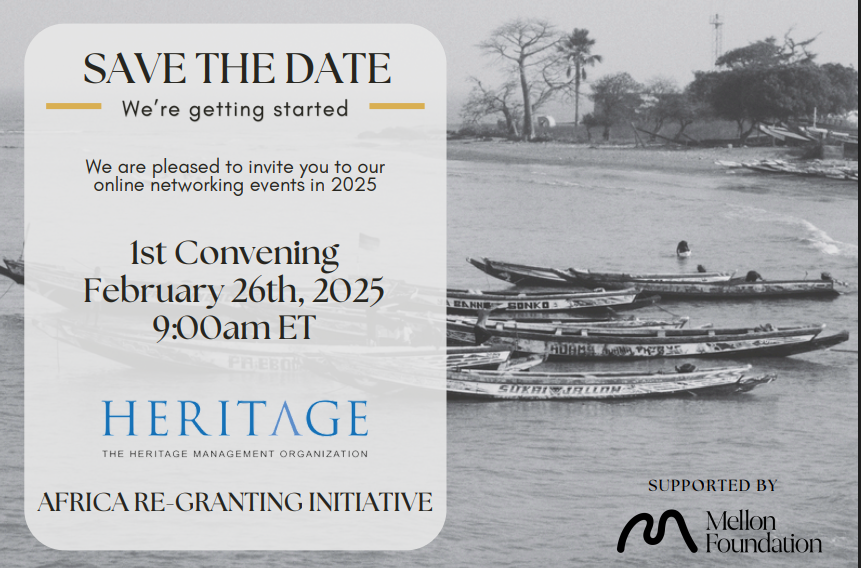 *The 12 projects presented at the first meeting included:
*The 12 projects presented at the first meeting included:
Mahmoud Malik Saako | Ghana: ‘Islamic Heritage in northern Ghana’
Vitalice Ochieng | Kenya: ‘Cultural Heritage Promotion and Conservation of the Kaya Forests, Kenya’
Chifundo Dalireni | Malawi: ‘Protecting Chongoni heritage sites through community participation and effective governance’
Getinet Fetene Engida | Ethiopia: ‘Protecting Heritages in monasteries of UNESCO Lake Tana Biosphere Reserve’
William Mutta Tsaka | Kenya: ‘Restoration Work and Museum Establishment at Masee House in Kenya’
Moses Mkumpha | Malawi: ‘Restoration of Anti-Slave trade buildings and opening of Museums’
Daniel Ishaya Mwada | Nigeria: ‘Rehabilitation of Rabih’s Fort, Dikwa National Monument’
Kamya Stephen Kyobe | Uganda: ‘Uganda bark cloth revitalization Consortium; promoting communal Conservation / protection’
Eunitah Viriri | Zimbabwe: ‘Towards the Preservation and Promotion of Matendere Ruins in Zimbabwe’
Didas Mzirai | Kenya: ‘Bustani Resort – The Taveta Cultural and Agro-Ecotourism Center’
Njung Gislane Bih | Nigeria: ‘Solarization of National Museum Onikan (Lagos)’ (presentation delivered by her partner Tolulope Falola)
Tracey Viljoen | South Africa: ‘The Fisher Child and other stories. Sites of memory project’
HERITΛGE Highlights 2024
Training
HERITΛGE celebrated a record-breaking milestone in 2024, training over 1,000 heritage caretakers in a single year. Participants engaged in a wide range of programs, including three-day workshops conducted online and in person, two annual summer schools focusing on digital tools and community engagement, and specialized training tailored to specific regions, topics and organizations. These included programs on Street Art in The Gambia (which also produced a new mural for the country’s National Centre for the Arts and Culture), Heritage interpretation in Rwanda, Project Management for US Heritage Managers, and an introduction to Fundraising and Project Management in Iraq.
Heritage Threatened by Conflict, Natural Disasters, and Climate Change
HERITΛGE continued its mission to protect heritage at risk worldwide, strengthening existing partnerships and forging new ones. In Ukraine, the Digital Museum project that was funded by the Creative Europe’s Culture Helps initiative, trained museum professionals to use digital tools, ensuring operational continuity and community access during wartime. Simultaneously, the two-year Architecture in Times of War: The Ukrainian Model initiative – delivered in cooperation with the Kharkiv School of Architecture and Skeiron and the support of the US Embassy in Kyiv – is equipping students and educators with digital skills to document, preserve, and restore architectural heritage.
In Türkiye, HERITΛGE published comprehensive reports documenting historic sites affected by the February 2023 Türkiye-Syria earthquakes. These reports include protection recommendations and advocate for enhanced cultural heritage recovery in affected provinces. Meanwhile, in Pakistan, a new project launched to safeguard the early Buddhist heritage of the Swat Valley, an area under threat from conflict, climate change, and rapid development. In Yemen, efforts continued to preserve the unique earthen architecture of Shibam, a UNESCO World Heritage Site struggling under the weight of a decade-long civil war.
HERITΛGE in Africa
The HerMaP Africa initiative, generously supported by the Mellon Foundation, has delivered significant impact. Over 75 small heritage projects received funding, alongside the awarding of several fellowships and the training of more than 370 heritage managers in Ethiopia, Ghana, and Rwanda. New partnerships were also established to further these efforts. In The Gambia, HERITΛGE’s ongoing HerMaP Gambia initiative, co-funded by the European Union, provided training to enhance the country’s culture and tourism sectors. The program also facilitated a parliamentary delegation study tour in Greece and partnered with the NCAC to launch the country’s Intangible Cultural Heritage Register, a project supported by UNESCO.
Giving Heritage Managers New Tools
HERITΛGE made strides in empowering heritage managers with innovative tools and practices. The EU-funded SHIFT project advanced its work to make heritage more accessible and inclusive, with a consortium meeting and project presentation held in Athens. The AHEAD initiative, co-funded by the European Union’s Creative Europe program, introduced seminars (now available online) and launched a community-based artistic project in Crete, with similar activities planned for Italy and Spain. HERITΛGE also announced the launch of EMPATHS, a project designed to promote participatory heritage interpretation through new tools and training resources.
Creating Networks, Connecting Professionals
Collaboration and community-building remained central to HERITΛGE’s mission in 2024. The organization continued developing Greece’s Living Heritage Network, supported by the Ministry of Culture, with HERITΛGE actively contributing to its digital and physical infrastructure, member recruitment, and communications. Additionally, the newly established AHEAD Network brings together heritage managers and community members who share a vision of audience engagement and participation.
Knowledge Sharing
HERITΛGE emphasized the importance of knowledge-sharing through active participation in global events and publications. Director Dr. Evangelos Kyriakidis delivered a keynote at the Choc Des Legendes Conference in Ghana, held under the auspices of the country’s First Lady. The organization also sponsored PastForward 2024, the annual conference of the US National Trust for Historic Preservation. Other highlights included workshops and presentations at the 30th Annual Meeting of the European Association of Archaeologists and the ReImagining Public Collections conference in Hungary.
HERITΛGE contributed to a Horizon Europe-funded policy brief on digital cultural heritage and shared expertise through webinars, seminars, and public lectures. Notable online resources include audience development webinars from the AHEAD initiative and webinars on architectural preservation in Ukraine.
1st Global Staff Summit
Reflecting the growth in HERITΛGE’s activities and team, the organization hosted its inaugural Global Staff Summit in September. This online event brought together staff working in Africa, Asia, Europe and the Americas , marking the beginning of an annual tradition to foster collaboration and alignment across our expanding network.
Project Management Workshop in Rwanda
In October, heritage managers from fifteen institutions across Rwanda joined us online for our Project Management for Heritage Managers Workshop. The course aims to help stakeholders build a better understanding of how to effectively run heritage projects from inception to closure, including evaluation.
HERITΛGE’s Tim Healing started the programme by introducing the basic principles and tools of project management using four case studies from Ghana, South Africa, Niger and Sudan. Participants then focused on specific skills including budget planning, risk management, monitoring and grant writing in the planning and implementation phases of projects. Instructions were then given for the requirements of the final project which will be submitted in groups.
The 22 participants included officials from the Ministry of National Unity and Civic Engagement (MINUBUMWE), the Rwanda Cultural Heritage Academy, the Rwanda Metereology Agency, Kigali Independent University, Rwanda Queen’s Museum, Mfura foundation, the Rwanda Digital Cultural Archive and Rwanda History Archives (Heritage Hub), Amatha Tech/ Rwanda Digital Heritage Platform, RWANDA cultural Library, NZIZA NGO, Golden Class Travel Agency, Art & Travel Ltd, Bwishyura Kivu Boat Cooperative, and Marti’s public secretariat Ltd.
The course was well received and participants showed great interest in how to manage a project and attract potential funders.
The workshop’s focus on real-life case studies also provided actionable insights, which I can implement in ongoing projects.
“Learning how to balance heritage conservation with sustainable development, while involving local communities, was particularly valuable. The workshop’s focus on real-life case studies also provided actionable insights, which I can implement in ongoing projects.” said Aime Ntyonagize, Founder and Director of Amatha Tech/ Rwanda Digital Heritage Platform.
Personally, I liked how very experienced the instructor is in Project Management.
“Personally, I liked the way the instructor is very experienced in Project Management, impressive topics, facilitations and explanations from the trainers etc. To be precise and concise, what I liked most is the project management skills and qualities of a good project manager that I gained from the instructors and facilitators during the course. It was so impressive and fantastic,” said Emmy MUSINGUZI, Genocide Memorials & Site management Officer / Bisesero memorial site
Tim Healing is our interim director of African Grants, and capacity development officer helping small heritage organizations in Africa develop an application and ensure they manage their grant efficiently. Tim has over thirty years’ experience working as a project manager and has a professional background in project management, community and NGO development.
For more information about HERITΛGE’s workshops, go to our open courses page, or follow us on Facebook, Twitter / X, LinkedIn or Instagram.


